Meet the ‘hero rats’ sniffing out landmines in Cambodia
Lynn Houghton encounters the remarkable rodents that use their sense of smell to identify explosives
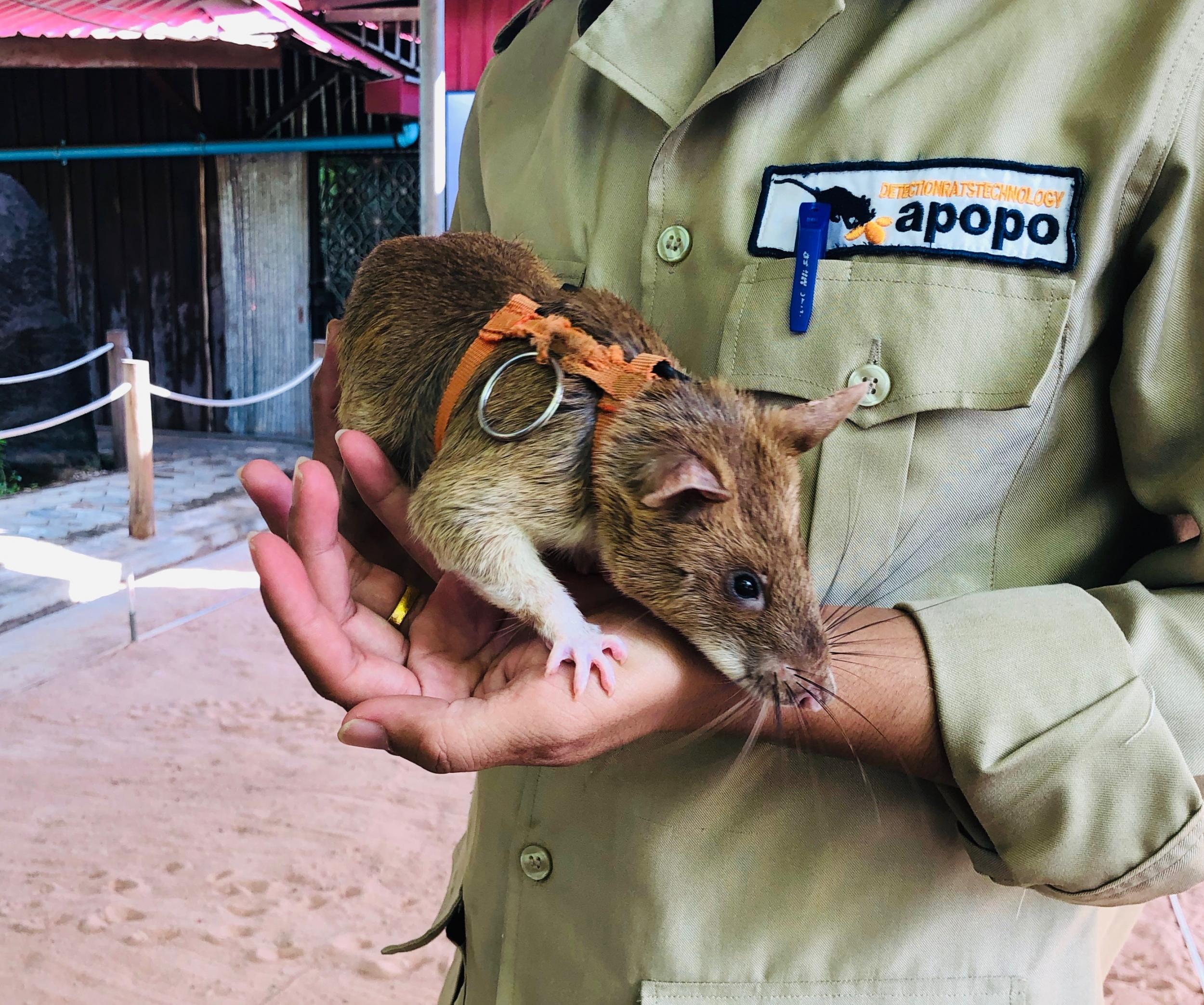
A rotary fan is clipped to my small table.
This ancient bit of equipment has no cage to prevent its blade hitting a passing limb, but its soft breeze is enough to induce slumber. I’m in Sambor Prei Kuk, northern Cambodia, staying in a traditional stilt house converted to a homestay. Three generations live here, all under one roof. Even so, they share their space with visiting tourists; the income supplementing a farming family’s meagre earnings.
Every movement and footstep upstairs, where guests sleep, seems amplified. The rooms are separated by paper-thin walls and light shines from the Cambodian family’s “living room” up through the slats in the floor. Festooned with hammocks and shared with dogs, chickens and children from next door, this space has a primitive kitchen and a pathway that leads to two Asian-style bathrooms with western toilets. The only other quarters are a room where the family sleep.
Vehicles rumble past during the night. With the road just a few metres away; the sound interrupts dreamless sleep. I do my utmost to rest, as tomorrow brings the opportunity to visit a very exciting project.
While tourism has brought a modicum of prosperity to Cambodia after years of war in the second half of the 20th century, the rural population is still mostly poor or just out of poverty.
However, there is another, more serious remnant of the years of conflict that haunt this country. Particularly in the far north, anti-personnel and anti-tank mines, unexploded artillery rounds, grenades, mortars and aerial bombs still litter the countryside.
A unique NGO based in Siem Reap is now dealing head-on with the issue. The Apopo Landmine Project and Visitor’s Centre opened here in 2014 and uses trained African giant pouched rats, aka “hero rats”, to sniff out landmines and other deadly devices in remote parts of Cambodia. These very special rodents use their remarkable sense of smell to detect explosive material. They are too light to set off pressure-activated mines and are faster and more accurate than conventional metal detectors.
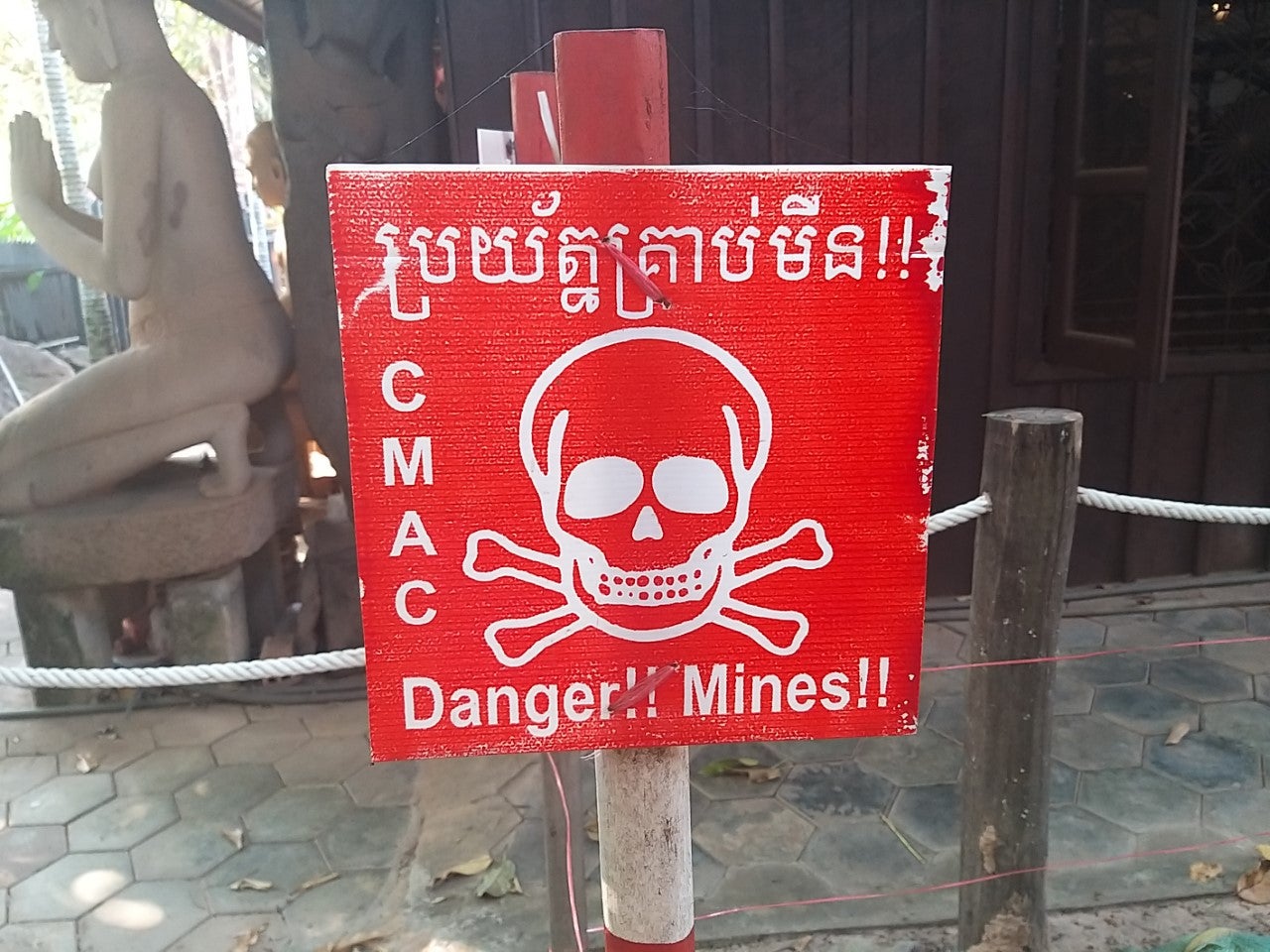
The Apopo visitor’s centre is on the outskirts of town, its unassuming frontage belying the important project just beyond. It’s 9am and the hero rats and their handlers have been out in the field since dawn. They are practising the skills for which they will receive a reward – food. A group of us are welcomed by Meas Sambat, manager of the visitor’s centre, who will lead a tour of the property.
He explains the basic premise of the project and its beginnings. It is the brainchild of Bart Weetjens, who kept African giant rats as pets. The idea to develop these rats’ phenomenal sense of smell to detect explosives grew into the Apopo, or Anti-Personnel Landmines Detection Product Development, project. After approximately one year of training, each rodent is ready to be a hero rat. With a life expectancy of eight years, it means they can work for Apopo for five to six years.
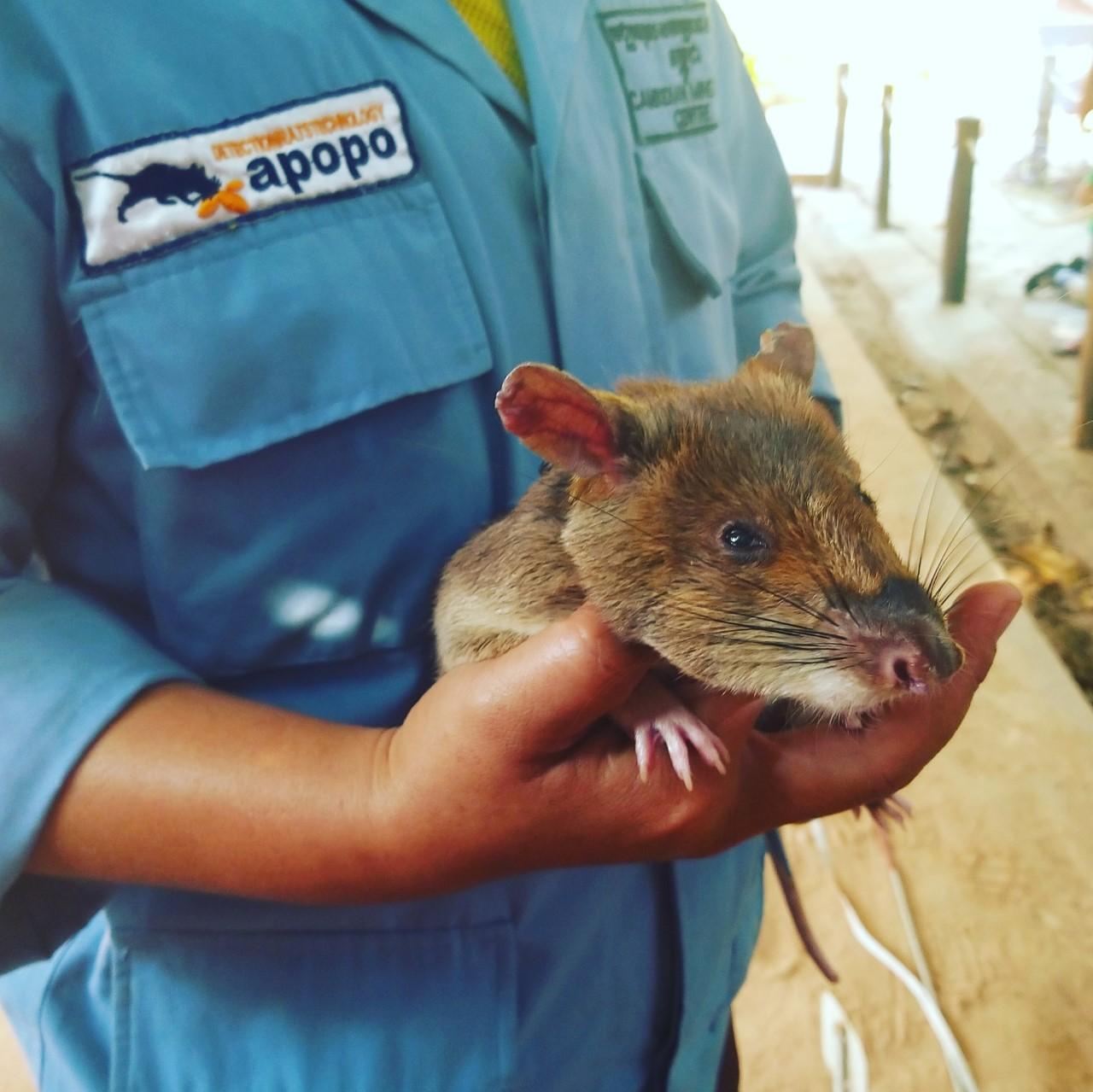
The tour of the visitor’s centre includes a demonstration of one of the rats in action. Biri is harnessed to a single piece of rope which is then stretched out and held taut by two people. This allows the handler to carefully control the direction of the animal as it immediately starts sniffing the ground. Another part of the centre displays a grim slice of reality: detonated landmines visible just below the surface of a small section of land.
Visitors then move on to their own game of sniff recognition, trying to match a scent as a rat would. We sniff a cylinder containing a specific odour. Participants are then directed to a selection of ten containers holding different scents. One of the containers holds the odour we have already smelt. Each of us is then challenged to match up the correct scent, much as the rats must do.
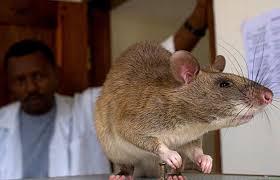
Making sure these rats keep their nose to the grindstone is critical. It is estimated by the Cambodian Mine Action Centre that there could still be 6 million landmines, or more, in Cambodia. Rural poverty means that ordinary farmers take extraordinary and dangerous chances farming in these territories. They have no choice.
Michael Heiman, director of the project in Cambodia, tells me more about Apopo’s mission: “Cambodia has a major problem with landmines, particularly in rural areas. This three-decade-long legacy of war has had a severe toll on this country’s people, which have the highest landmine accident rate per capita in the world. We use giant African pouched rats from Tanzania, as their accurate smelling ability allows them to detect these unexploded mines. The animals are trained before being sent to us and are then integrated into our operation. The biggest advantage with rats is that they skip over irrelevant materials.”
“Apopo communicates to outsiders that this is a strictly controlled environment,” he says. “The rats wear harnesses that are attached to a rope and they sniff along delineated rows. It is later examined by a detonation team. Since 2016, 4.5 million sq m have been covered, with 1,200 landmines found and disposed of. Currently, 51 hero rats are living and working at the Siem Reap Apopo Centre.”
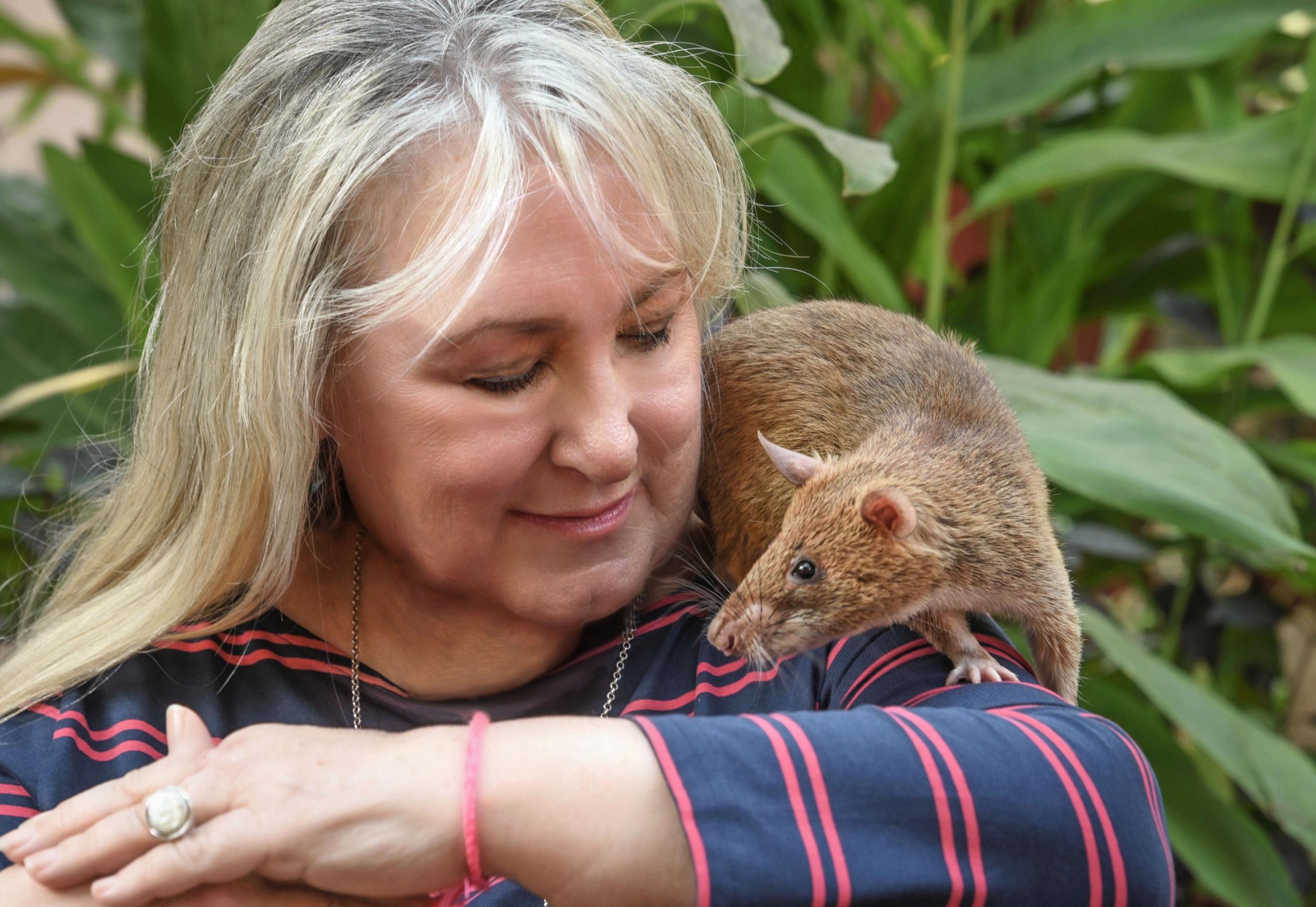
When a chance to hold a female rat is offered, I jump at it. Karmel rests on my shoulder, tickling my face with her long sensitive whiskers. I let her nibble my finger, but she probably thinks I am giving her food and bites more enthusiastically than expected. When these animals are retired at the age of about six years old, they are “let out to pasture” and allowed to play with other OAPs in a large cage full of stimulating toys and games.
With a remarkable success rate of nearly 93 per cent, hundreds of hectares of land have been cleared. Detonating, then removing, the landmines and unexploded munitions enables farmers to replant the rice fields and grow crops such as cashew nuts.

To see firsthand the removal, aided by these wonderful creatures, of a still-present and life-threatening risk for Cambodians is truly inspiring. The scars of war may run deep, but it’s comforting to see a team of humans and animals helping to heal the land and its people.
Travel essentials
Explore’s 13-day Heart of Cambodia trip costs from £1,881pp including return flights, 12 nights’ accommodation, some meals, local transport and an Explore tour leader. For more information and to book, visit explore.co.uk
For information on sponsoring a Hero Rat visit apopo.org/en/support-us
Join our commenting forum
Join thought-provoking conversations, follow other Independent readers and see their replies
Comments